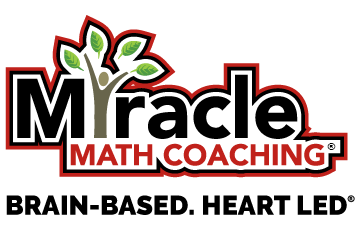How to Provide “Growth Feedback”
By Deanna Hurn, Founder and Executive Director of Miracle Math Coaching
As a board member of the National Tutoring Association, I’ve had the wonderful opportunity of contributing to its Mentor Workbook. The most recent section I wrote helps mentors give growth feedback to mentees. Because the information can be useful to parents, I’m sharing it with you here.
Giving growth feedback is one of the most important contributions a mentor can make to a mentee’s future success. Mentors can motivate, encourage and model positive behavior, but giving feedback is more significant. And offering growth feedback is even more significant than that.
Of the many tools employed in mentoring, only growth feedback steers students down a specific path toward sustained achievement. It ensures students are progressing and also growing. In this case, growth means achieving the goal while gaining confidence, strength and knowledge of how to achieve future goals.
For mentors to provide effective growth feedback, they should first established SMART (Specific, Measurable, Attainable, Relevant, Time-Bound) goals with mentees. Once that’s done, here are some tips for providing growth feedback:
Meet in a place where your mentee feels most comfortable.
It’s normal to be nervous about receiving feedback, especially if the news might not be so good. People are more likely to absorb information when they’re relaxed. That could be on a park bench or in a booth at a local restaurant. Better yet, ask your mentee to decide.
Begin with the positive.
If you look carefully enough, you can find the positive in any level of performance. For successful mentees, this is easy. Let them know how proud you are, and praise their efforts. For mentees who’ve struggled, think about non-tangibles that might belie the end result. Is her low test score at least higher than on the last test? Did he have fewer detentions than before? Ask your mentees themselves what positive action – no matter how small – they took. And even if there’s no noticeable improvements, give them props for being willing to try to do better.
Acknowledge the feelings of mentees who didn’t meet their goals.
Before digging into feedback, give students a chance to process their emotions. Some kids might not want to open up, but allow them the space to do it. “Let’s forget about _______ (the test, your behavior). How are you feeling?” or “Whatever you’re feeling, it’s okay.” And avoid filling the silences. Though uncomfortable, silence gives some students time to muster the courage to speak.
Identify why your mentee did well or not so well. Instead of asking negative questions, try to talk about the underlying reasons for what happened. Have them walk you through the events/scenarios that led to the final outcome. Take note of the actions your mentee took or failed to take that led to the end result. Offer your observation of areas to focus on for improvement. Ask what can be done differently. Brainstorm ideas. Talk through scenarios of what to do if he or she is thrown off track again.
Use the feedback conveyed to discuss adjustments, if needed, going forward.
Help mentees reflect on how they can use your feedback now and in their future experiences. Look for online tools and strategies to help with “SMART Goal Setting and Achievement.” You’ll find steps to show mentees how to identify all the important and measurable adjustments they can make based upon your feedback. Let them know that these are techniques they can use for life. Start the discussion with: “Now that we know some of the issues, what can you change for a better outcome?” Have them write down one or two specific actions they will take, ie visiting the teacher after-school once a week or studying for at least 30 minutes every day. Set up a meeting to check in and assess progress.
Provide guidance that helps mentees grow in confidence and in ability to overcome both current and future obstacles
Studies show that children who are praised for their effort, rather than for their intellect, have greater confidence. Let your mentees know that their expending the effort to do better – regardless of the outcome – counts for a lot. Share your own struggles and breakthroughs. And tell them about successful people like Michael Jordan, who didn’t make his high school basketball team, or Walt Disney, fired from a newspaper job because his boss said he “lacked imagination.”
Though it doesn’t seem related, teach them the importance of gratitude.
Grateful young people are more engaged and satisfied with their school and community. Engagement is key to getting mentees to move forward. So have them draft a gratitude list to help bolster how they relate to their world.
Finally, emphasize the importance of “grit.” It’s the ability to persevere in spite of obstacles and is the characteristic most closely related to academic achievement.
For further help with feedback or to get a FREE Assessment for your child, contact us or complete the Assessment Form online!







